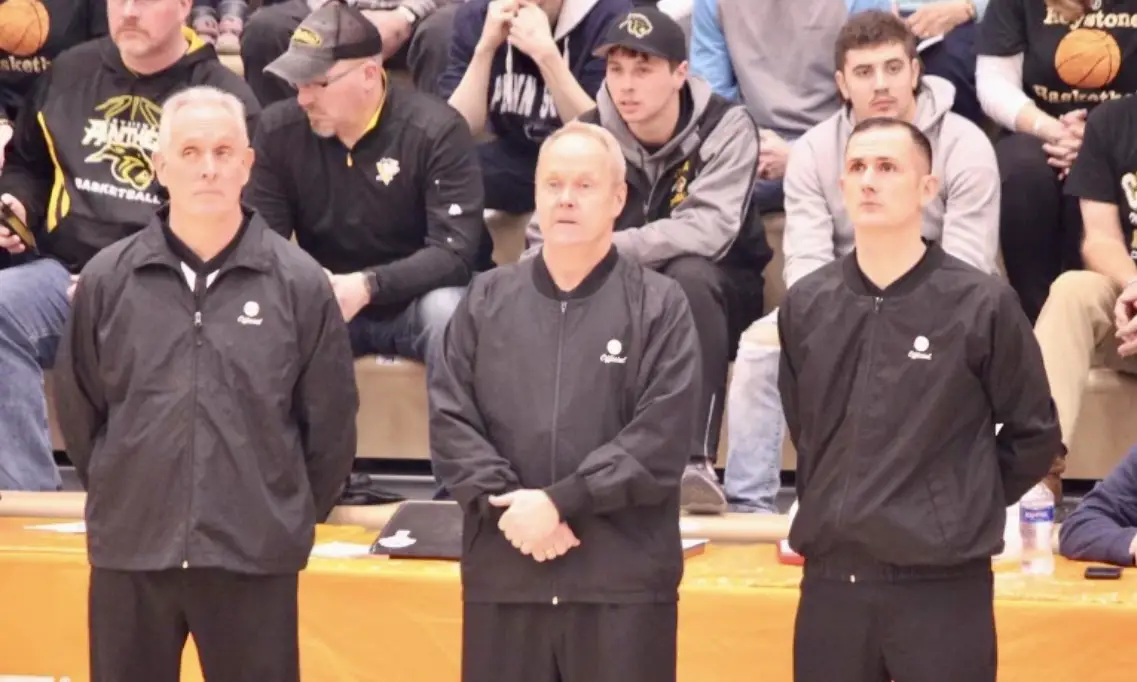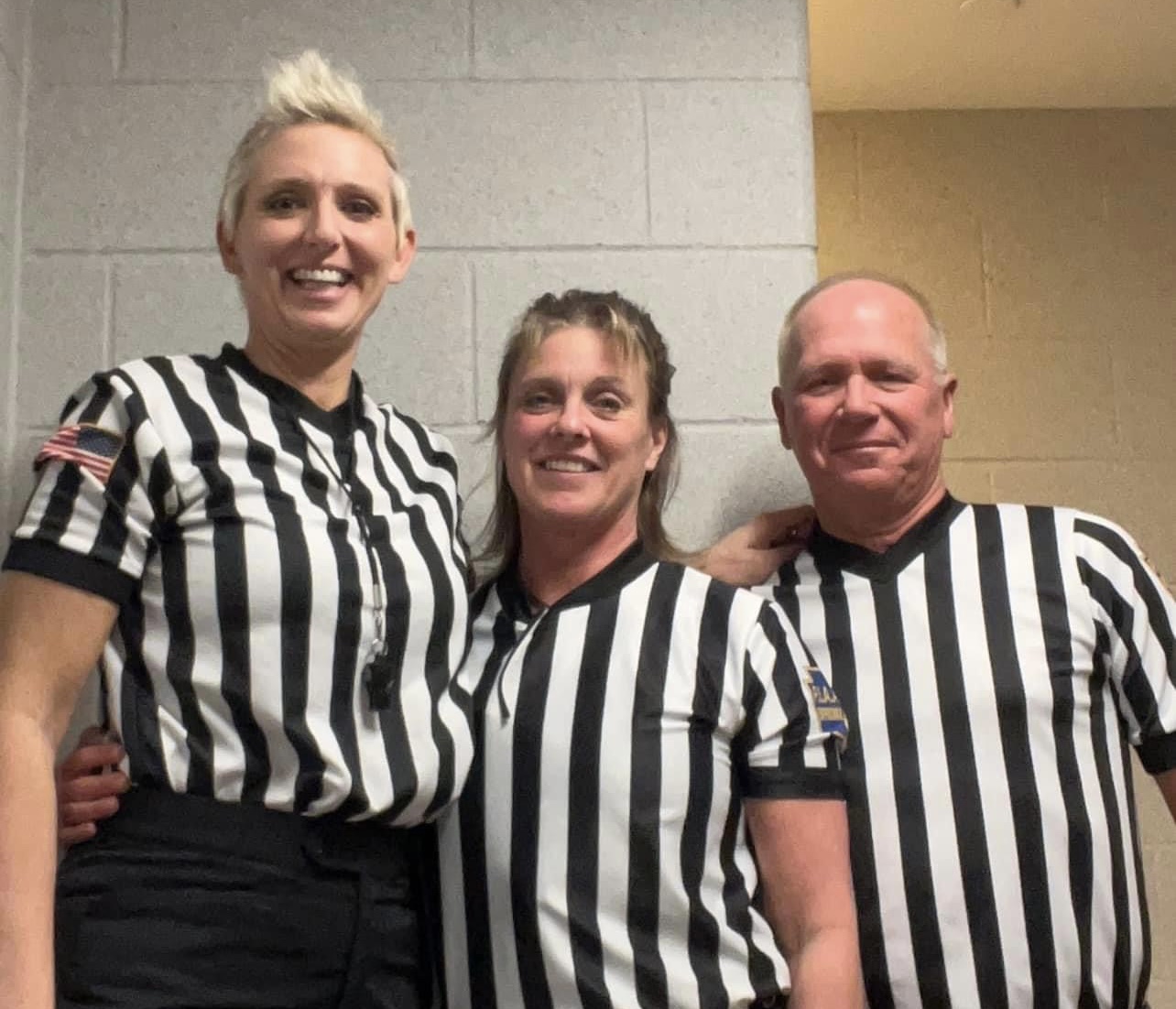
ST. MARYS, Pa. (EYT/D9) — Ed Baumcratz was beat.
He was exhausted. His muscles ached. It took him a week to recover from the pounding his body took over high school basketball tip-off tournament weekend last December.
(Above, from left, officials Kevin Mortimer, Kevin Doverspike and Ed Baumcratz get set to work a game)
Officiating nine games in two days will do that to even the fittest of officials.
“At 41, I feel like I’m in good shape,” Baumcratz said. “But after my nine-game weekend, for the next week I was sore and I said to myself, ‘I’ll never do that again.’”
But for Baumcratz, the vice president of the Clarion County referee chapter and president of Keystone Shortway Athletic Conference officials, the extreme workload on tip-off weekend was a necessity.
It was the only way to get every game officiated amid what is become a crisis, not only locally, but across the state and nation.
Official rolls are shrinking at an alarming rate.
“It’s pretty bad, and I kind of noticed it last year,” Baumcratz said. “The hardest days for a basketball official are the tip-off tournament weekend and the Christmas tournaments because everybody’s trying to play on the same dates. I did seven varsity and two JV games. We’re being lined up to go from Union to Redbank Valley to North Clarion. Schools have to work with the assigner to schedule their game times to have these games covered.”
The situation is only getting worse.
CRISIS ON THE HORIZON
Local chapters are seeing numbers dwindle. Across the state, fewer and fewer people are stepping up to fill the ranks.
To compound the problem, current officials who have already been working for more than three decades will soon retire. That will leave an even bigger void.
“The next three years for basketball is gonna be critical to get some new blood,” Baumcratz said. “Before games, I have guys with both knees in braces. They’re getting lathered up with Icy Hot and Bengay. They’re wearing compression shorts or pants and they’re just doing everything they can to keep going because they know we’re shorthanded.
“They do it because they love the game,” added Baumcratz, who is also the principal at North Clarion Area High School. “Our older officials, we’ve learned a lot from them and we appreciate them and we’re trying to pave the way for the next generation of referees.”
That next generation, however, isn’t coming in the numbers that are needed.
Dave Blair, the PIAA statewide rules interpreter and one of the best football officials in the commonwealth for three decades before stepping into that role, said the situation bas become dire.
While District 9 schools haven’t had the need to move games from Friday nights to Thursday or Saturday because of the shortage — yet — other districts in the state haven’t been so lucky.
District 10’s shortage is more serious. Several schools in that district — including Oil City — have been forced to alter their schedules to accommodate officials.
The only way to avoid disaster is to find a way to attract more people — the younger the better.
“We have to get them at a younger age,” Blair said. “It takes three, four, five years to get acclimated to what you’re doing, understand not only the rules, but the philosophy and the mechanics. So if we can get them at an early age and get them involved with it, we not only have that longevity, but it offers them an opportunity to move to the next level.
“I’ve worked Division I, II and III college games and the sooner they get moving, the more opportunity there is to maybe even make it to the NFL, if that’s their desire.”
Blair would settle for just a few more good high school football officials in each chapter.
Like in basketball, the majority of the football officials across the state are 50 or older, Blair said. And those older officials can’t be on the field on Friday nights forever.
“The next three to five years, because of age, is going to be crucial,” Blair said. “In the early 80s to the early 90s, we had a big influx — a lot of people came into the avocation. Now all those people, like myself, are in our late 50s, 60s — we have some guys 70 years old — who are going to be moving out of the on-the-field activities. We need younger people.”
The PIAA has been trying to figure out just how to do that for years.
There’s no easy answer.
WHAT’S THE SOLUTION?
Blair appealed to high school players at the District 9 Football Media Day last week at St. Marys High School.
He pitched to them the prospect of staying involved in the game through officiating when their days in helmets and pads were over.
“It’s everything that they’ve learned from playing, be it conflict resolution, teamwork, overcoming adversity — we do that as an official as well,” Blair said. “And we have to learn people skills. Officials are basically the third team out on that field.”
Baumcratz said the Clarion County chapter is trying to attract new officials by mitigating some of the up-front financial cost, like purchasing the first uniform and paying for clearances.
The chapter is also holding seminars to help prospective officials study for and pass their required tests.
They are also working with Clarion University to offer an officiating class through the school’s sports management program.
The PIAA is also trying to launch various initiatives to bring more people into the officiating fold.
The issue, however, is very complex, which makes it difficult to zero in on a remedy.
“The PIAA knows it’s a problem and they’re working for a solution,” Baumcratz said. “But I don’t really know what the right solution is. It’s just a bit of everything and going trough the COVID years didn’t help. It kicked a lot of people out, whether it was health reasons, or they just didn’t want to wear a mask.”
There is another question that needs to be asked. It also has an ambiguous answer.
Why are people shying away from becoming officials?
“I think it’s a multi-faceted issue,” Blair said. “I think some of it is cultural. Some of it is the sign of the times. A lot of what I hear is people don’t like to get yelled at. Sportsmanship is a big, big thing. I seen an ever-increasing belief that it is OK to go after officials by the fans, by the coach and everyone else, especially at this level.”
Fan behavior is the top reason why people have shunned becoming an official, several current officials have said.

(From left, Bobbie Freeman, Kris Stiglitz and James Lambert)
FAN BEHAVIOR CHASING PEOPLE AWAY
Shannon Kluck is a basketball junkie. She played the game. She follows it very closely to this day.
The Venango Catholic graduate has been officiating for nearly two decades. She is currently working in District 10.
She said abuse officials take has never been worse.
“Just the level of stress that you receive from simply making a call with all the intent of being fair is shocking,” she said. “It’s just become so personal. It’s not like, ‘Hey, that’s a bad call!” because we can handle that. It’s attacking our size. Our looks. Our sex. It’s attacking anything they can think of. There are schools where I refuse to work.”
Kluck remembers when she was a player. She admits she also fell into the trap of being unkind to officials.
“I was a jerk and if I could go back, I would slap my younger self because of the way I was disrespectful to some officials,” Kluck said. “Now that is almost encouraged. It’s almost like hockey fighting — oh, it’s just part of the game. No. It’s really not.”
Bobbie Freeman, a Clarion Area High School graduate, has been officiating volleyball and basketball for eight years. She said the best way to attract new officials is to reign in some of the fan misbehavior.
“People tell me all the time that they can’t deal with the fans,” Freeman said. “Even experienced officials at the state level, people who have done games in Hershey, have told me they don’t know if they can keep doing it. They tell me they’re getting older and they just can’t deal with it anymore. Every year, fans are getting worse.
“Schools need to hold fans more accountable,” Freeman said. “Personally, I block it out. I’m there for the kids and for the love of the game.”
Freeman and Kluck both agree that if poor fan behavior is curbed, more people will become officials.
Baumcratz also agrees that the negative interactions with fans have soured people on becoming an official.
“It’s hard to find an employee in a normal workforce that has someone over their shoulder all the time, yelling at them night after night after night,” Baumcratz said. “That is sometimes a factor in why people don’t want to do it.”
But it’s by far not the only issue, he said.
He said one issue that is brought up — pay — is not as big as some people insist it is.
“It’s a combination of a lot of factors,” Baumcratz said. “But I don’t think it’s the pay. I don’t think that’s the case. You pay more and you’re gonna get people who aren’t there for the right reasons. They’re just there for a paycheck and not to do the right thing for the kids and give them a good experience. It’s not all about the money.”
FOR THE LOVE OF THE GAME
There is one thing all current officials have in common.
The love for the sport they officiate.
It’s why they do it. It’s why they take on doubleheaders. It’s why they run from junior high games in New Bethlehem to varsity games in Rimersburg on the same night. It’s why they keep coming back to withstand the physical abuse, aches and pains — and sometimes the mental abuse from fans.
“We continue to stick with it because we love it — we have an absolute love for the game,” Freeman said. “We played it. We were once where these young kids were and we want to give them 100%. We take a lot of pride in what we do and we continue to educate ourselves by going to conventions. We continue to learn and grow. We want to make sure these kids have the best experience and it would be a shame if they couldn’t have it because there weren’t enough officials.”
HOW TO HELP BY BECOMING AN OFFICIAL
If you would like to learn more about becoming an official, visit here.
Or email Ed Baumcratz at ebaumcratz@nccsd.org












